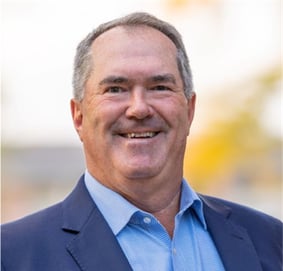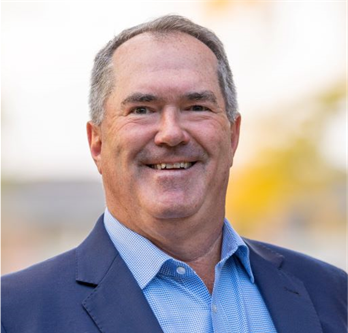About. John Beagle joined the Bradley Impact Fund board of directors in 2022. As chairman and co-founder of Grace Matthews, John has led over one hundred mergers and acquisitions in the chemical and materials sector. He serves on several boards, and along with his wife, Gwyn, often takes an active role in the groups he supports philanthropically.
 Three years ago, you and your wife, Gwyn, discussed your philanthropic approach with the Impact Fund. But what drew you toward greater involvement with the Impact Fund as a board member?
Three years ago, you and your wife, Gwyn, discussed your philanthropic approach with the Impact Fund. But what drew you toward greater involvement with the Impact Fund as a board member?
For most of my life, I naively assumed that most Americans agreed on some basic things—for example, that the US was fundamentally a good nation that, on balance, was a positive force in the world. I thought there was agreement that a quality education truly was a civil right, that poverty could and should be addressed. We should all judge people by the content of their character rather than the color of their skin. You know, basic stuff. People of good faith could disagree on the methodology, I thought, but at least we agreed that certain things were fundamentally true.
But it hit me recently that my assumptions were completely and dangerously wrong. Things are different now, and I don’t believe that the issues facing America can be solved top-down with a magic bullet or some miracle piece of legislation. Instead, it’s the less glamorous blocking and tackling that will get us there, an inch at a time.
In my career, I met many people who were good at identifying problems, which is important, as well as a smaller subset who rolled up their sleeves and got to work solving them. The Bradley Impact Fund community does both of these and does them well. Bradley Impact Fund’s core principles of Constitutional order, civil society, free markets, and informed citizens seem to me to be a pretty darn good place to start.
Dwight Eisenhower said, “Farming looks mighty easy when your plow is a pencil and you’re a thousand miles from the corn field.” I’ve been incredibly blessed in my career, as well as with my family and friends. I have a little bit more time available now, and I still have a lot of energy, so it was time for me to get closer to the corn field. The folks at Bradley Impact Fund, to stick with the metaphor, are already growing bumper crops, so I was happy to roll my sleeves up and get involved.
How does your experience as an engineer and as chairman and co-founder of Grace Matthews impact your philanthropic philosophy/strategy?
I basically got into engineering because, where I come from in upstate New York, that’s what you did when you were good at math but didn’t know what you wanted to do. As an engineer, you learn how things work, and more importantly, you learn how things fail. You also learn that great ideas aren’t really worth that much until they’re implemented efficiently. After working as a semiconductor materials research engineer for a few years, I went back to business school and ultimately ended up advising clients on mergers, acquisitions, and financings in the chemicals and materials industries. The transition to investment banking was actually kind of easy, mostly because corporate mergers and acquisitions are nothing like you see on TV. There’s nowhere near as much boardroom drama. Instead, like engineering, it’s about getting hundreds—sometimes thousands—of details right.
.Working in this environment for the last thirty years taught me that the importance of planning, resourcing, and execution cannot be overstated in predicting an organization’s success. The Bradley Impact Fund understands, at the risk of being oversimplistic, how things work. They understand how communities work, how people interact with government, and they have a broad reach. They vet organizations that share Bradley’s priorities and support the best of the best with the resources to succeed.
It’s interesting—if you have a small group of people and they’re motivated and aligned and talented, you can do great things. In 1990, I was part of the small team that built the fastest computer chip in the world. At Grace Matthews, my colleagues built a truly exceptional organization—a small giant. So, if you look at the Bradley Impact Fund, it’s a small group of people who share a common vision, know what they’re doing, and focus on results. They work as a team, and they get things done. Talk about an organization that punches above its weight class!
One more experience: I was raised conservative, but it wasn’t until I went to work in Prague in 1991 that I really understood freedom. You could say I knew the words, but I didn’t know the music. Seeing the effects of communism up close really teaches you the music. The evils perpetrated on the Czech people were horrifying and endemic. They didn’t sign up for the oppression and squalor of communism, they thought they were signing up for utopian equality. But, to use just one example, one comrade’s “free apartment” was the Renaissance-era flat overlooking the river, and another’s was the square concrete rabbit hutch in the slums. The illusion of equality didn’t last long, but the totalitarian aftereffects lasted for decades. After the Berlin Wall fell, my Czech colleagues were so enamored with their new freedoms that they would vote on everything—including where to go to lunch. The lesson for me was that we need to stop taking our freedoms for granted here in the US.
A recent WSJ article focused on “activist house flipping” groups like Acts Housing, on whose board you’ve served for years. How are you seeing this space (i.e., fostering home ownership for families) evolve?
About twenty years ago, I was fortunate enough to serve on a corporate board with Harvard Business School professor Clayton Christensen, the father of the “Disruptive Innovation” theory of market and organizational change. One of its key tenets is that it is highly unusual for an incumbent in any business ecosystem to make fundamental changes to the system. The common example is the typewriter company Smith Corona, which was caught off guard by personal computers and found itself obsolete in a short time. Incumbents tend to ignore threats and ride the wave downwards.
The folks at Acts Housing are very smart and remarkably good at what they do, so they recognized that they faced an existential challenge from the hedge funds, private equity, and other investors who are snapping up single family homes. Some organizations in that position would just ride the “typewriter curve” down, but Acts didn’t. They approached a very thorny problem deliberately and thoughtfully, and launched the Home Ownership Acquisition Fund. This pivot allows Acts to bid quickly and on similar terms as institutional investors, creating a level playing field for our client families. A lot of organizations couldn’t have pulled that off, but with the support of the Impact Fund donor community, we’re well on our way.
Acts is first and foremost about family and community. Are there any higher-level lessons to be learned from Acts’ success?
The Acts Housing neighborhood bus tour had an incredible impact on me. You see up close how their rehab projects are run. One of their families was gracious enough to invite us in to see their newly refurbished house. I’ll never forget going into the kitchen—the fridge was covered with magnets and artwork and papers with A-plus grades. We went into the living room and there are these two big recliner chairs facing a big-screen TV with the Brewers game on. It hit me—this wasn’t some hypothetical refurbished house, this was a family home, and this awesome room was where the dad hung out with his wife and kids after work. The dad and I exchanged a look, he justifiably proud, and me humbled by the creation of this special home. There are thousands of these stories; this is what Acts Housing does.
I genuinely believe that families that own homes are safer, happier, and become better citizens. So, when Acts succeeds, it’s not just the families who win—it’s their communities, the small businesses in those communities, the city, the state, and the country.
Acts has helped some 3,500 families move from staying in a place to living in a home, including helping them develop sweat equity through renovations of the properties. It’s about as bottom-up as you can get. Conversely, top-down government programs, while sometimes helpful, are incredibly inefficient and generally have unintended negative consequences. The Acts model is the exact opposite—our families have to save money for a modest down payment and learn how to be homeowners. It takes time, effort, and commitment. They take a foreclosed house with frozen pipes and turn it into a home. Tell me they haven’t earned it.
As far as the big hedge funds and the impact they’re having on house prices . . . I have some concerns with them, because absentee landlords really are not the way to build strong communities and cities. Home ownership is. But if it weren’t for the collapse of families and communities and the decoupling of effort and outcomes, there wouldn’t be so many abandoned houses in the first place. To get mad at BlackRock for what is happening in housing markets is to get mad at a symptom. The BlackRocks of the world are funded by our insurance companies, our 401(k) retirement accounts, and our pension plans. We gave them a job to do—make us money. So, we invited them into our struggling communities and they buy homes and rent them out at a profit. If we don’t like it, we only have ourselves to blame. So, it’s complicated. Fortunately, Acts Housing is less complicated. They are doing something one hundred percent positive in the same environment, so I think it’s important and valuable to back this when it’s done well.


